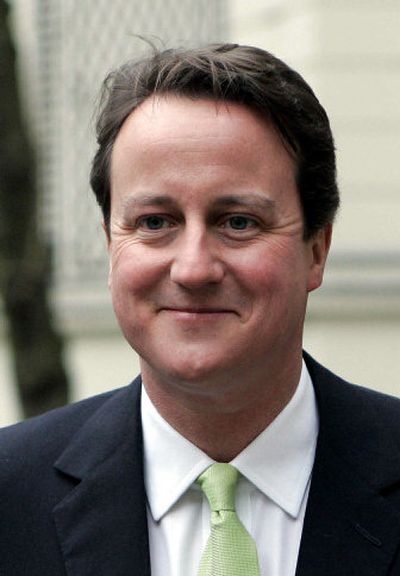New leader fuels Tory ‘excitement’

LONDON – He’s a 39-year-old urban professional who quotes Gandhi, fights poverty with rock star Bob Geldof, wants to stand up to big business and is so worried about global warming that he’s planning to erect a wind turbine on his roof.
Meet David Cameron, Conservative.
Since his election last month as Conservative Party leader, Cameron has shaken up his party like a man beating a carpet with a stick. Sitting atop an organization that has been sputtering since no-nonsense Prime Minister Margaret Thatcher left office in 1990, Cameron has startled Britain with policy pronouncements and stylistic flourishes rare for a leader of the Tories, as the party is known.
His supporters are betting that combination will make him a formidable challenger to succeed Prime Minister Tony Blair. While some Conservatives worry that he has abandoned their party’s “middle England” core values, many more said Cameron was a shot of adrenaline for a party disheartened after three consecutive elections losses to Blair’s Labor Party.
“Because of Cameron, there’s a new sort of feel – there’s an excitement, there’s a feeling we can win,” said Laurence Robertson, a Tory member of parliament. “The man in the pub, the man in the street, they are taking an interest for the first time in a long time in what we are doing.”
Robertson and other Conservatives said Labor was frightened by Cameron, but several Labor members of parliament said they were closer to amused. “He’s making all these touchy-feely statements, but none of it is backed up,” said Labor MP Fraser Kemp. “The British Tory party is still a pretty right-wing organization. The new gloss paint is going to fade.”
Since taking over, Cameron has worked frenetically to stay in the public eye, turning an annual British cultural phenomenon to his advantage.
From just before Christmas until just after New Year’s, virtually every business in Britain shuts down. While Blair decamped to a vacation at Sharm el-Sheik, a resort in Egypt, Cameron worked during the holiday lull and kept public attention focused squarely on himself.
One day he signed up Geldof as an anti-poverty adviser, the next he demanded that employers address the “morally wrong” gender gap in pay, and then he distanced himself from Thatcher – a venerated Tory icon – by saying he “will not be the prisoner of an ideological past.”
He rode his environmentally friendly bike to work. He surveyed endangered waterways. Then came full-page advertisements in New Year’s Day newspapers trumpeting his political call to arms:
“As the world is changing, so must we,” Cameron wrote, calling change “the central objective in 2006 of a modern, compassionate Conservative Party.” He said he wanted “every single member and supporter of the Conservative Party to remember that personal commitment is the most powerful way to bring about change: As Gandhi said, ‘We must be the change we want to see in the world.’ “
Michael Gove, a Tory MP, said Cameron was using his “modern, informal, accessible and relaxed” style to refocus the party’s image. He said the Conservatives in recent years have tended to accentuate the “grim, tough, efficient, austere, no-nonsense” aspects of their economic policies, while underplaying party policies that are “inclusive, compassionate and socially concerned.”
Cameron has said that many of his proposals are designed to challenge Labor for the political middle ground. He has already abandoned party positions he helped draft before last May’s general elections. The Tories ran ads on immigration that critics said bordered on xenophobic, but Cameron has now called for a more welcoming stance.
In a speech Wednesday, he scrapped another proposal he helped draft, a health care plan that would allow some people to opt out of the National Health Service. Now, calling that essentially a taxpayer-funded perk for the wealthy, Cameron is advocating a strengthening of the health service for all – a position much closer to Labor’s.
Britain’s next general election will take place in 2010 at the latest, and perhaps sooner if Blair decides to step aside, as many predict.